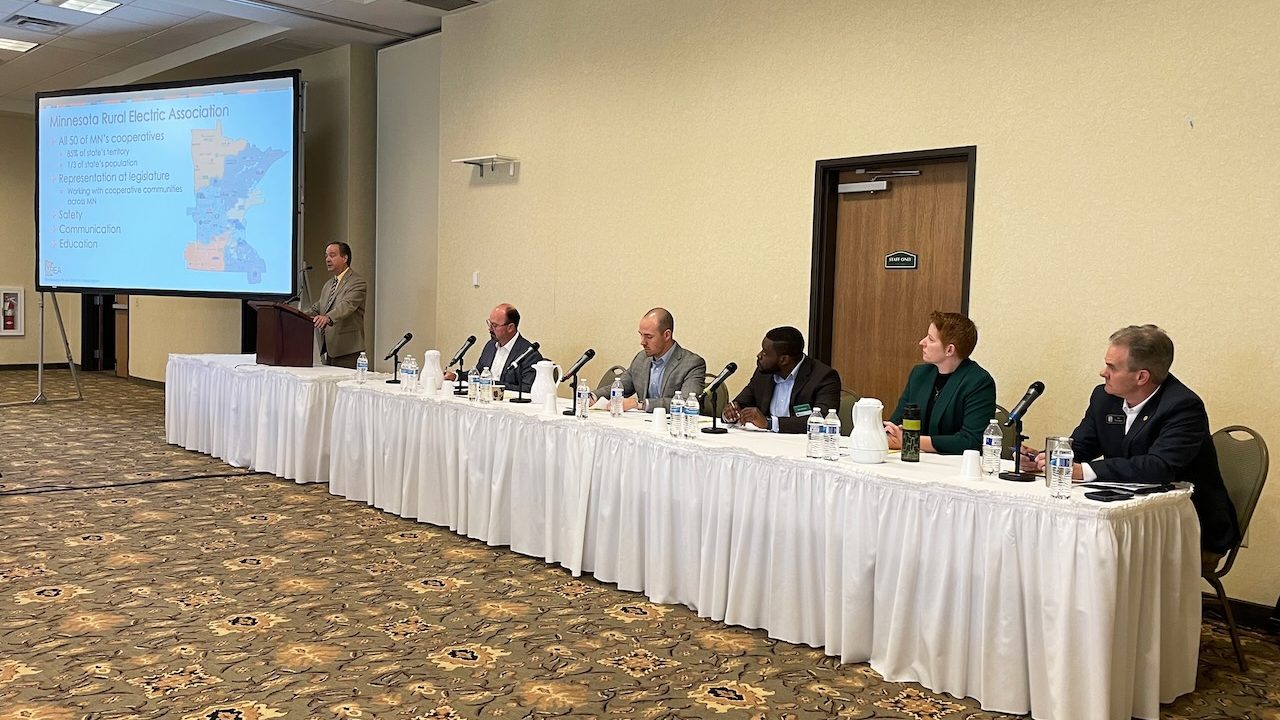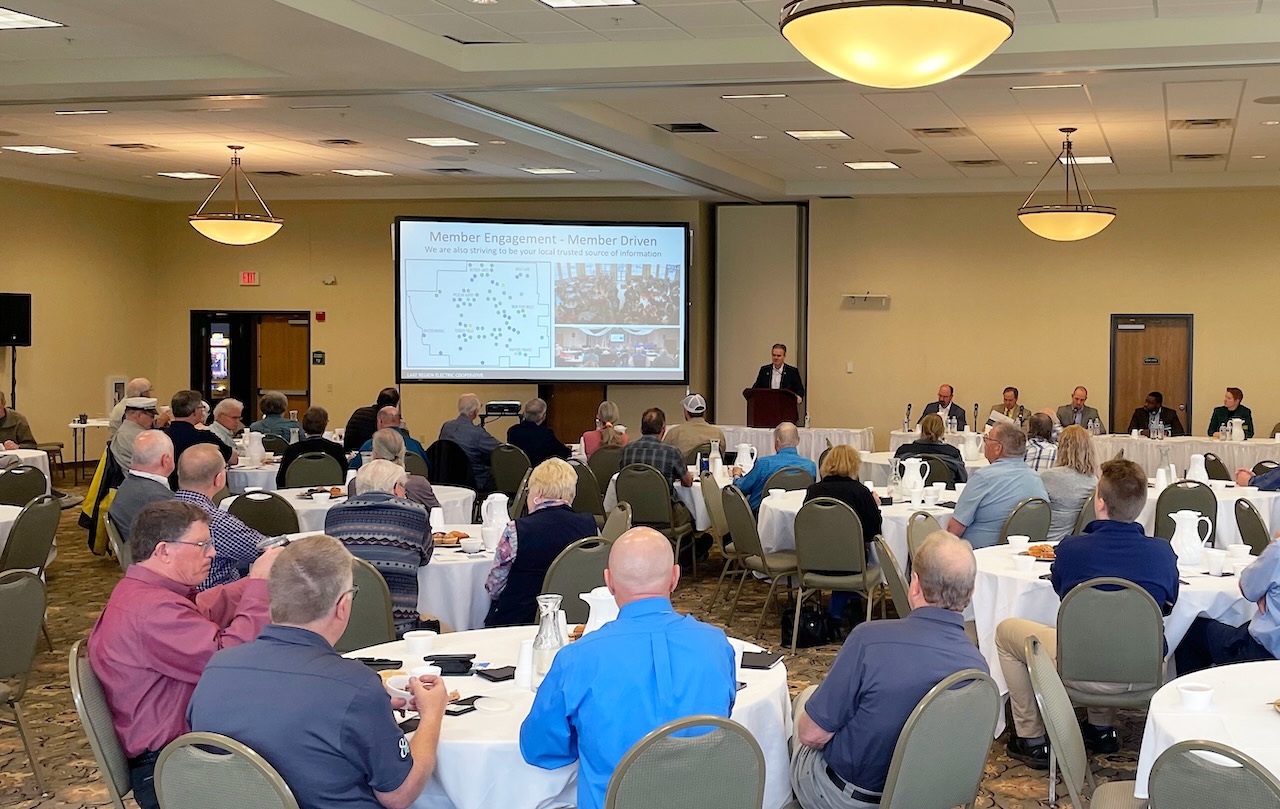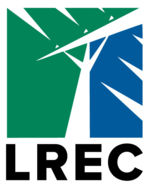This new release was published May 18, 2023, by the Minnesota Rural Electric Association (MREA).
To view a recording of the energy forum, please click here.


Photo 1: Darrick Moe, MREA, discussed the transition to meet the new 100% carbon free bill recently passed in Minnesota.
Photo 2: Lake Region CEO Tim Thompson welcomed members and encouraged their involvement in their electric cooperative and energy discussion.
Nearly 100 people attended Lake Region Electric Cooperative’s (LREC) Energy Forum held at Thumper Pond, Ottertail, on May 18. The energy forum provided the opportunity for LREC’s member-owners, community leaders and the general public to hear firsthand how electric cooperatives are ready to meet the challenges of the new energy economy brought on by recent legislation.
Lake Region CEO Tim Thompson welcomed everyone and spoke of how engaged Lake Region’s membership is when it comes to their cooperative.
“As a member-owned cooperative, we are happy to have our members engaged in these important discussions,” he said. “We want to be your trusted source for energy information.”
Topics at the forum included power supply and transmission planning, reliabililty, renewable energy, battery storage, energy affordability and the mining of minerals and metals needed to achieve energy goals. The forum brought together a host of energy leaders to discuss how electric cooperatives are working to continue to provide ongoing reliable, affordable electricity to more than 1.7 million Minnesotans.
Minnesota Rural Electric Association CEO Darrick Moe discussed the recently passed 100% carbon free legislation and how it could impact affordability and reliability of the electric system in Minnesota.
“There needs to be a massive, transformational change in electricity sources by 2040 to meet this goal,” Moe said. “Innovation has to increase a lot to figure out how we are going to keep the system reliable so that the lights come on when you flip the switch.”
Leadership from Great River Energy — LREC’s wholesale power provider — also spoke at the event, including Vice President and Chief Transmission Officer at Great River Energy Priti Patel who discussed the need for significant transmission upgrades to meet the new goals.
“Building transmission is a strategic solution to some of the challenges that we face as thermal generation retires and our region transitions to increased penetration of renewable generation,” Patel said.
Zac Ruzycki, director of resource planning at Great River Energy, discussed how the cooperative has been planning an executing the transition of its power supply portfolio away from coal-based power in favor of renewables and marketplace purchases. The company is also piloting new battery technology in partnership with Form Energy.
“This is a challenging target to reach,” Ruzycki said, referencing the 100% carbon free legislation signed in February. “However, the measures we have taken over the past decade put Great River Energy and our members in a strong position to comply with the law with minimal rate impacts.”
Tolu Omotoso, director of energy solutions at the National Rural Electric Cooperative Association, discussed the development and availability of technology to provide reliable power and financial savings to consumers. New technologies are being developed and used on the consumer’s side of the meter to help provide power to the grid during high demand times. Omotoso highlighted the abundance of government grants and loans available at this time.
“This is the biggest investment in the grid ever,” he said referring to grants being provided through the Inflation Reduction Act and other government programs.
Julie Lucas, executive director at Mining Minnesota, spoke about the need to actually talk about mining. She said we don’t like to talk about, but mining is critical to the new energy transition.
“We need to talk honestly about mining,” she said. “The electric transition is metal hungry. We are going from fossil fuel dependence to mineral dependence.”
After the speakers, there was a robust round of questions about property rights and permitting, renewable energy costs, retiring coal plants, off-peak rates, bio-resources and more. Those who attended were appreciative of LREC providing the opportunity to have an open discussion about the energy transition.
The Minnesota Rural Electric Association (MREA) is a nonprofit trade association serving Minnesota’s electric cooperatives. MREA provides legislative and regulatory representation, director and employee education programs, technical training for electric cooperative line workers, and serves as the focal point for cooperation among cooperatives. Minnesota’s 44 distribution cooperatives serve about 1.7 million Minnesotans in all 87 counties and operate the largest distribution network in the state with more than 135,000 miles of electric lines.
 Lake Region Electric Cooperative
Lake Region Electric Cooperative